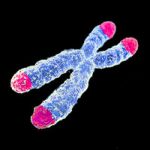 Dr. Blackburn and Dr. Elissa Epel’s research shows that the length and health of one’s telomeres are a biological underpinning of the long-hypothesized mind-body connection.
Dr. Blackburn and Dr. Elissa Epel’s research shows that the length and health of one’s telomeres are a biological underpinning of the long-hypothesized mind-body connection.
Dr. Blackburn is the winner of the 2009 Nobel Prize in Physiology or Medicine for discovering telomeres, telomerase, and their role in the aging process.
Dr. Epel is the Director of the Aging, Metabolism, and Emotions Lab, and the Center for Obesity Assessment, Study, & Treatment, (COAST), Associate Director of the Center for Health and Community, and Associate Director of the NIH-funded UCSF Nutrition and Obesity Research Center (NORC). She studies psychological, social, and behavioral processes related to chronic psychological stress that accelerate biological aging, with a focus on the telomere/telomerase maintenance system. She also studies the interconnections between emotional processes, eating, and metabolism.
Most of us have an intellectual understanding about the importance of getting enough quality sleep, exercise, and food. We feel stress and if we believe it is harmful, there can be impacts on our telomeres.
This book explains what to do to improve your telomeres and your health.
Telomere are the an essential part of the human cells that affect how our cells age.1,2
Source: “What is a Telomere?”, https://www.tasciences.com/what-is-a-telomere/
1. Jaskelioff M, et al. Telomerase reactivation reverses tissue degeneration in aged telomerase-deficient mice. Nature. 2011;469:102-107.
2. Sahin E, DePinho RA. Linking functional decline of telomeres, mitochondria and stem cells during ageing. Nature. 2010;464:520-528.
[Photo: Flickr user AJC1]
